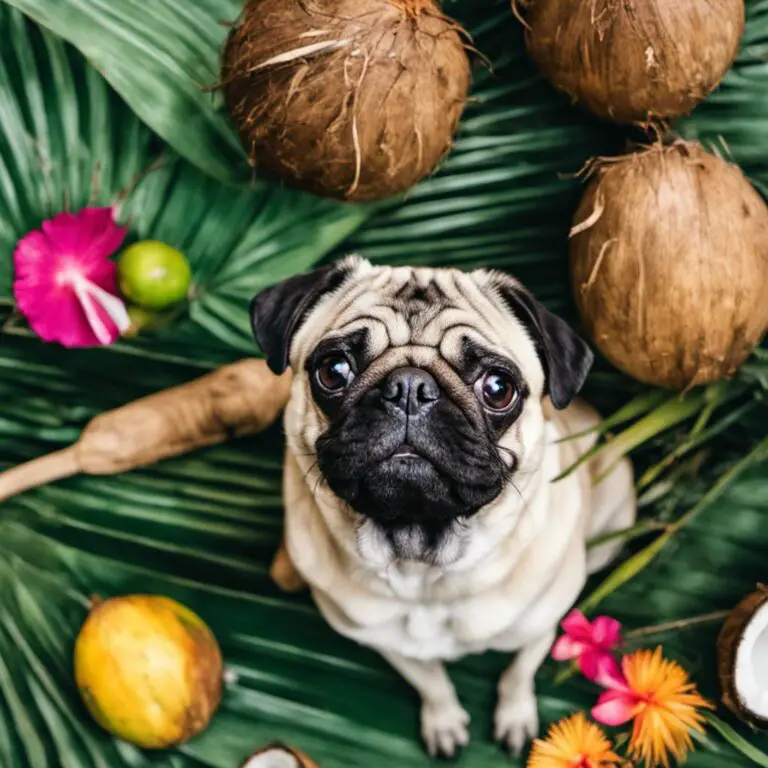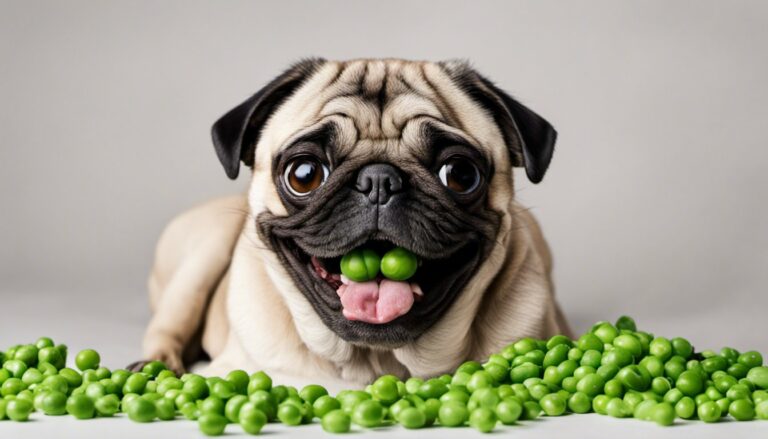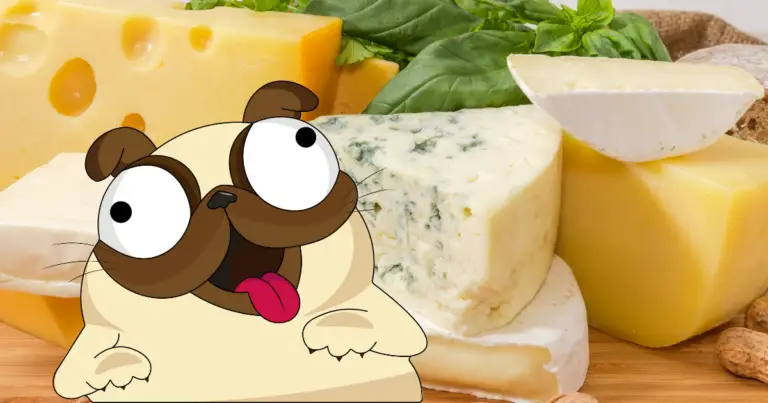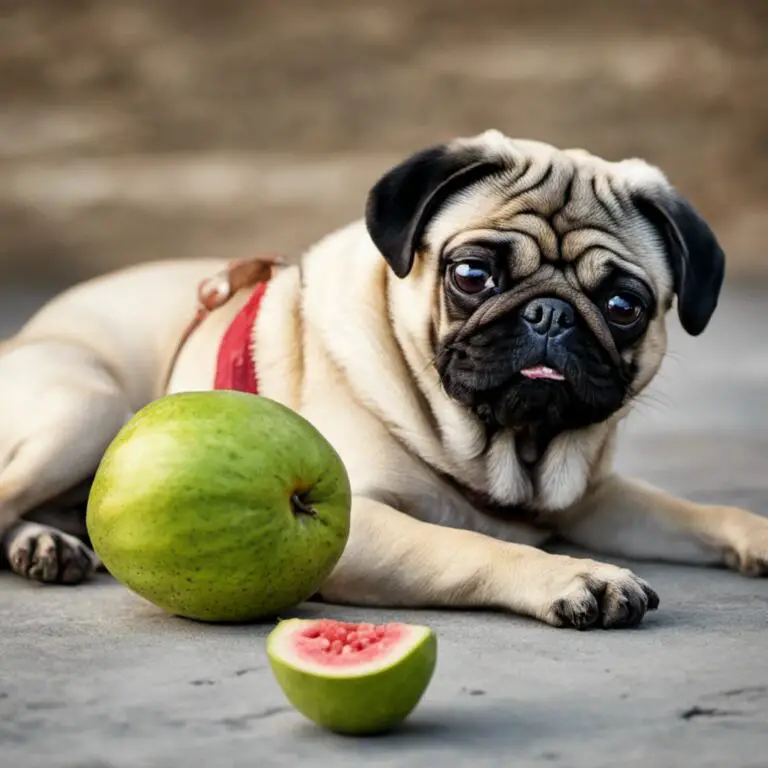Can Pugs Eat Yogurt? A Nutritional Guide for Dog Owners
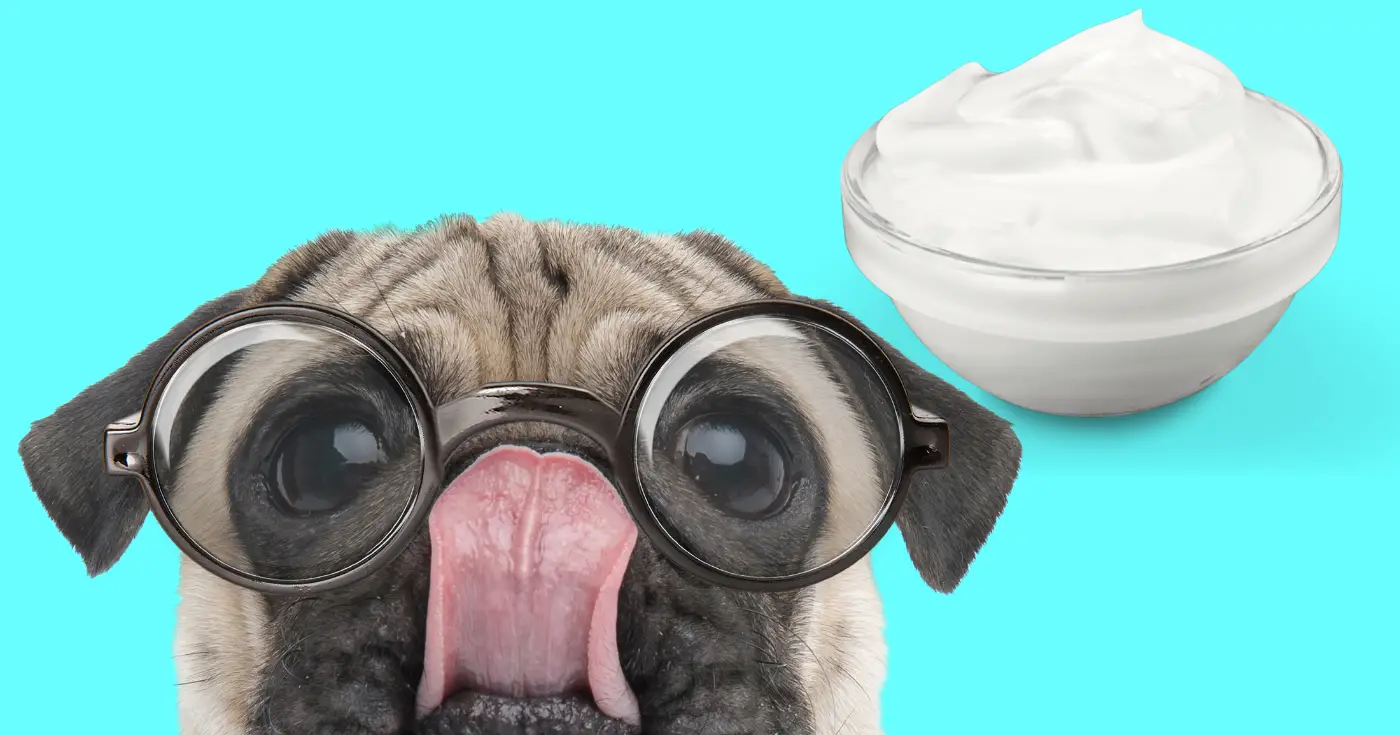
Can Pugs Eat Yogurt? As a pug owner, it’s natural to wonder if your furry friend can safely enjoy yogurt. After all, yogurt is a popular snack for humans due to its numerous health benefits. However, before including yogurt in your pug’s diet, it is crucial to understand how it may affect your dog’s health.

Fortunately, most dogs, including pugs, can consume yogurt without any adverse effects. In fact, plain or non-fat plain yogurt without any sweeteners or preservatives is considered suitable for dogs. Yogurt can be a good source of calcium, protein, and probiotics for your pug if given in moderation.
That being said, it is essential to thoroughly check the ingredients before offering yogurt to your pug. Avoid yogurts that contain xylitol or artificial sweeteners, as they can be harmful to your pet. Always choose plain, unsweetened yogurt as a treat to ensure your pug’s safety and enjoyment.
Contents
Table of Contents
Understanding Pugs and Their Dietary Needs

When considering the dietary needs of your pug, it is essential to understand their unique characteristics and requirements to ensure their optimal health. Pugs, like all dogs, need a balanced diet rich in vitamins, minerals, and nutrients to thrive. However, due to their distinct physiology and genetic factors, they have some unique dietary considerations.
Get The Free Food Eating Guide That Keeps My Pug Happy and Playful Even at 13 Years Old
100% Beginner Friendly & Lists Real Foods Your Pug Can Actually Eat!

First, it’s important to note that pugs are prone to certain health issues, such as obesity. So, it is crucial to be mindful of their calorie intake and ensure their food contains proper nutrients. A pug’s diet should contain approximately 18% crude protein, and protein levels should not exceed 22%. Additionally, crude fatty acids should account for about 5% of an adult pug’s food and 8% of a puppy’s food intake.
To provide your pug with essential vitamins and minerals, you may want to include a mix of fruits, vegetables, and other low-calorie, high-fiber snacks in their diet. For instance, apples are an excellent source of vitamins A and C, which can promote healthy skin, coat, and overall health. Removing seeds and cores from apples is essential, but the skin is completely safe for your pug to consume.
Moreover, it is vital to acknowledge that there are some foods pugs should avoid entirely. Foods such as chocolate, grapes, or onions are toxic to dogs and may lead to severe health complications. Maintain a list of unsafe foods and ensure your pug is not exposed.
Balancing your pug’s diet with the appropriate nutrients, vitamins, and minerals while carefully avoiding unhealthy foods, will go a long way in ensuring their overall health and well-being. By taking into account their unique dietary needs, you can create a meal plan that supports your pug’s health and longevity.
Can Pugs Eat Yogurt: The Basics

When it comes to feeding your pug, it’s natural to wonder about incorporating various food items into their diet. One such food is yogurt. Yes, your pug can safely enjoy yogurt, but you should keep a few things in mind before serving this treat to your furry friend.
First of all, it is important to choose a plain, unsweetened yogurt for your pug. Many flavored yogurts contain artificial sweeteners and added sugars, which can be harmful to your dog. Stick with plain yogurt to avoid unnecessary additives.
In moderation, yogurt can offer some health benefits for pugs, including providing a source of probiotics to aid digestion. However, not all pugs tolerate yogurt well. Some canines may experience digestive upset due to lactose intolerance or dairy product allergies. In such cases, it’s best to avoid yogurt altogether. If you want to test whether your pug can handle yogurt, start by offering a small amount and monitor them for any adverse reactions.
Keep in mind that yogurt should never replace well-balanced dog food as the primary source of nutrients for your pug. Instead, consider offering it as an occasional treat or mixing it with their regular meals to enhance the flavor and provide a boost of probiotics.
If you have any concerns about incorporating yogurt into your pug’s diet or suspect your pug may have a lactose intolerance or dairy allergy, consult your veterinarian for personalized advice. They can guide your pug’s best dietary choices, taking into account their specific health needs and preferences.
To summarize, plain yogurt can be a safe and beneficial treat for pugs when given in moderation, as long as they don’t have lactose intolerance or a dairy allergy. Always consult your veterinarian if you have any concerns about introducing new foods to your pug’s diet.
Health Benefits of Yogurt for Pugs

Yogurt can offer numerous health benefits for your Pug when incorporated into their diet in moderation. Packed with essential nutrients, yogurt can be a tasty treat that also provides valuable nutrients for your furry friend.
One notable benefit of yogurt is its high protein content. Your Pug will appreciate the extra protein boost, helping maintain strong muscles and overall health. In addition to that, yogurt contains calcium, supporting strong bones and teeth, which is especially crucial as your Pug ages.
Moreover, yogurt is known for its probiotic properties. Including a good source of probiotics in your Pug’s diet can aid in maintaining a healthy digestive system. Probiotics support the growth of beneficial bacteria in the gut, contributing to better nutrient absorption and potentially reducing digestive issues.
Another reason to consider yogurt as a treat for your Pug is that it may also provide some immunity-boosting benefits. While this isn’t guaranteed, some studies suggest that the probiotics found in yogurt can help the immune system fend off pathogens and promote overall health.
When offering yogurt to your Pug, it’s essential to be aware of potential lactose intolerance issues. Some dogs may have difficulty digesting lactose, which is found in dairy products like yogurt. To avoid any digestive upset, opt for a plain, unsweetened variety with low lactose content or seek out a specially formulated dog-friendly yogurt.
In summary, incorporating yogurt into your Pug’s diet can provide various health benefits, such as protein, calcium, and probiotics. Just make sure to choose a suitable yogurt variety and monitor your Pug for any adverse reactions.
Understanding Yogurt: What to Look For and Avoid
When considering yogurt as a treat for your pug, it’s essential to understand what to look for and avoid in the yogurt variety. Yogurt can be a good source of beneficial bacteria, protein, and calcium for dogs. However, not all yogurts are suitable for pugs or other canine friends.
Firstly, lactose can be an issue for some dogs as they may be lactose intolerant. Plain Greek yogurt is a better option, as it contains less lactose than regular yogurt. It’s also essential to choose yogurts with live bacteria called probiotics, which are beneficial for gut health like this kind.
When it comes to sweeteners, it’s crucial to avoid yogurts with added sugar, as it can be harmful to dogs and lead to obesity and other health issues. Artificial sweeteners, such as xylitol, are even more dangerous as they can be toxic to dogs. For your pug’s safety, stick to plain yogurt with no added sugar or artificial sweeteners.
When shopping for yogurt, make sure to read the label carefully. Look for plain, unsweetened yogurt without any fruit flavors or mix-ins, which often contain extra sugar or artificial sweeteners. Greek yogurt is a great choice due to its thicker texture and higher protein content, but be sure it’s also free of unnecessary additives.
In summary:
- Choose plain yogurt with live probiotics
- Favor Greek yogurt due to its lower lactose content and higher protein content
- Avoid added sugar and artificial sweeteners
- Read the label carefully to ensure you’re selecting the right yogurt for your pug
By keeping these points in mind, you can make an informed decision about whether yogurt is a suitable treat for your pug, and what kind to offer them. Just remember always to monitor your dog’s reactions when introducing new foods and consult your veterinarian if you’re unsure.
Can Pugs Eat Yogurt? Watch this
Potential Risks and Side Effects
While yogurt is generally safe for dogs to consume, you should be aware of potential risks and side effects, especially for pugs. Feeding your pug yogurt may cause unwanted discomfort or health problems.
One common issue some dogs face when consuming yogurt is lactose intolerance. Just like humans, some dogs are unable to properly digest lactose, which can lead to gas, diarrhea, or vomiting. If your pug has never had yogurt before, it’s important to start with a small amount and monitor for any signs of stomach upset or intolerance.
Another potential risk is the presence of xylitol, a sugar substitute often found in some yogurts. Xylitol is toxic to dogs and can cause a rapid release of insulin, leading to hypoglycemia (low blood sugar), seizures, and even death. Always check the yogurt’s ingredient list to ensure it does not contain xylitol before offering it to your pug.
Overfeeding yogurt to your pug may also contribute to pancreatitis, a painful and potentially life-threatening inflammation of the pancreas. A high-fat diet can cause pancreatitis, and while yogurt is not excessively high in fat, excessive consumption could still lead to problems.
To reduce the likelihood of these potential risks and side effects:
- Start with a small amount of yogurt to test for lactose intolerance.
- Always choose a yogurt with no added sugars or artificial sweeteners, especially xylitol.
- Limit the frequency and amount of yogurt you offer to your pug as a treat rather than a dietary staple.
By being mindful of these potential risks and side effects, you can help ensure that your pug enjoys the benefits of yogurt without experiencing any adverse reactions.
Serving Yogurt to Your Pug
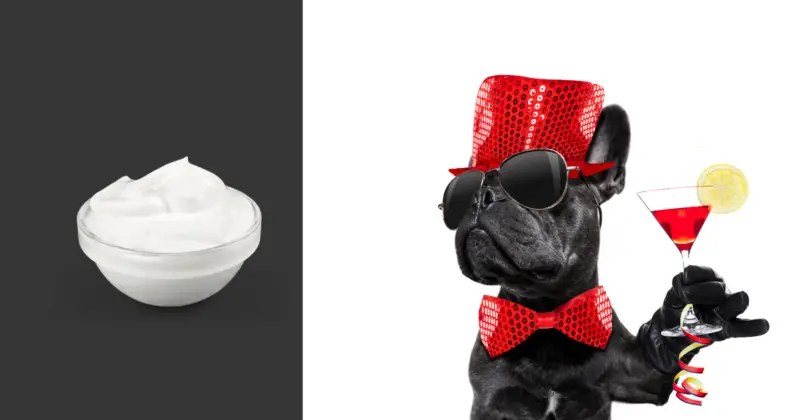
When considering yogurt as a treat for your pug, it’s important to remember that moderation is key. As a responsible pet owner, you should be confident in your knowledge of what’s best for your pug’s diet.
Begin by offering your pug a small amount of yogurt, such as a teaspoon or two. Plain, unsweetened yogurt is the best choice, as flavored yogurts often contain added sugars and artificial sweeteners that can be harmful to dogs. You may also opt for Greek yogurt, as it has higher protein content and lower lactose levels, making it easier for your pug to digest.
Yogurt can be fed to your pug as an occasional treat, but be sure to monitor your dog’s reaction to it. Due to lactose intolerance, some pugs may experience digestive issues, such as gas or diarrhea. If you notice any negative side effects, it’s best to discontinue feeding them yogurt.
Another way to serve yogurt is by freezing it in small portions to create a cool and refreshing treat for your pug on hot days. You can even mix in some healthy additions, like blueberries or pumpkin puree, for extra flavor and nutrients. Just make sure to avoid potentially harmful ingredients like grapes and chocolate.
Lastly, ensure that your pug’s regular diet remains balanced and nutritious. Yogurt should not be a substitute for their main meals, but rather, an occasional treat to enjoy in combination with their standard diet. Always consult your veterinarian if you have any concerns about adding new foods to your pug’s meal plan.
Alternatives to Yogurt in a Pug’s Diet

If you’re considering adding yogurt to your pug’s diet, exploring other food alternatives that may offer similar nutritional benefits is essential. Here are some fruits, vegetables, and other food options that can be safely incorporated into your pug’s diet:
Fruits and Vegetables: Many fruits and vegetables are safe for pugs and can provide essential vitamins and nutrients. For example, you can give your pug carrots, strawberries, and blueberries as a healthy, low-calorie snack. Remember, avoiding certain fruits, such as avocado, is crucial as they can be toxic for dogs.
Cooked Meats: Lean meats like chicken are a fantastic source of protein for pugs. Ensure that any meat you feed your dog is thoroughly cooked and unseasoned, as some spices and seasonings can be harmful to dogs.
Eggs: Eggs are a nutritious and protein-rich food that can be enjoyed by pugs. Make sure to cook eggs thoroughly to eliminate the risk of salmonella.
Oatmeal: Cooked oatmeal is another healthy food option for pugs. It’s an excellent source of dietary fiber and can help support digestion. When preparing oatmeal for your pug, avoid adding sugar or other sweeteners.
When incorporating these food items into your pug’s diet, always keep moderation in mind. While these foods can be beneficial, balancing them with high-quality dog food that offers complete nutrition tailored to your dog’s needs is essential.
Feeding your pug a balanced diet that includes both dog food and selected human food can help maintain your furry companion’s health and support their overall well-being. Experiment with different fruits, vegetables, and other healthy options to determine which ones your pug enjoys the most while ensuring their diet supports their health.
Foods Pugs Should Avoid

Being a responsible pug owner, knowing which foods are toxic and should be avoided in your pet’s diet is essential. Understanding the risks associated with certain foods can help prevent potential health issues.
Firstly, it’s critical to avoid foods containing onions and garlic. These vegetables contain compounds that can damage your pug’s red blood cells, leading to anemia. Similarly, avocados should be off-limits for your pug, as they contain persin, a toxin that can cause vomiting and diarrhea in dogs.
Another toxic food is cherries, particularly the pits, stems, and leaves containing cyanide. This toxin can cause difficulty breathing, weakness, and even death. Along the same lines, grapes and raisins should not be fed to pugs as they can cause kidney failure.
Mushrooms can be dangerous for pugs as well. Some varieties contain toxins that can be lethal, while others can cause gastrointestinal distress. It’s best to be cautious and avoid feeding your pug any mushrooms to prevent complications.
Items containing caffeine, such as coffee and tea, should be kept away from pugs. Caffeine can cause an increased heart rate, tremors, and even seizures in dogs. Also, tomatoes, specifically the stems and leaves, contain solanine which can be toxic to pugs. Eating these parts can lead to gastrointestinal issues, muscle weakness, and tremors.
Lastly, be cautious with seeds from various fruits, as they often contain toxins. For example, apple seeds contain cyanide, which can be harmful if ingested by your pug.
You can ensure they maintain a healthy and balanced lifestyle by being knowledgeable about these toxic foods and keeping them out of your pug’s diet. Be confident in your ability to provide the best care for your beloved pet by staying well-informed about their nutritional needs and possible dietary hazards.
Frequently Asked Questions

Is yogurt beneficial for pugs?
Yogurt can be beneficial for pugs as it contains probiotics that support gut health and digestion. However, it is important to keep in mind that some dogs may be lactose intolerant, which could lead to adverse reactions such as diarrhea or vomiting. Always consult with your veterinarian before introducing yogurt into your pug’s diet.
What type of yogurt is safe for dogs?
Plain, unsweetened yogurt is generally considered safe for dogs. Opting for yogurt with live, active cultures and no added sugars or artificial sweeteners is best. Flavored yogurts can have added ingredients, like xylitol, which can be harmful to dogs. Always check the ingredient list to ensure there are no harmful components.
Can pugs consume Greek yogurt?
Yes, pugs can consume Greek yogurt, as Greek yogurt has a similar composition to regular yogurt. However, it is higher in protein and has less lactose, which could be beneficial for dogs with lactose sensitivities. Make sure to choose a plain, unsweetened Greek yogurt without any harmful additives.
How much yogurt should I give my pug daily?
The appropriate amount of yogurt for your pug depends on their size and dietary needs. It is best to consult with your veterinarian for personalized recommendations. Generally, a small amount of yogurt, such as a teaspoon or tablespoon, can be introduced as a treat or mixed into their regular meals. Remember to monitor your pug for any signs of lactose intolerance or an upset stomach when introducing yogurt.
Are there lactose-free yogurt options for dogs?
Yes, there are lactose-free yogurt options available for dogs. These products can be especially beneficial for dogs with lactose sensitivities. When selecting a lactose-free yogurt, ensure it is also free of artificial sweeteners, sugars, and any harmful additives.
Is honey-flavored Greek yogurt safe for pugs?
Honey-flavored Greek yogurt should be safe for pugs, provided it doesn’t contain any artificial sweeteners or harmful ingredients. However, it’s best to choose a plain, unsweetened Greek yogurt to limit the sugar intake for your pug. If you wish to add natural sweetness, you can mix a small amount of raw honey into plain Greek yogurt, but do so sparingly to avoid excessive sugar intake.

